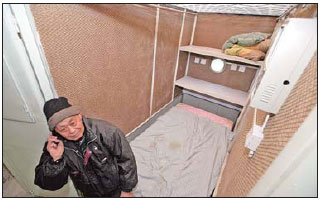Tiny homes hit a big problem
 |
|
Designer Huang Rixin in a capsule apartment. |
Change in rules mean they must go - and no one wants to buy them.
The third generation of Huang Rixin's "capsule apartment" project - which aimed to offer tiny living spaces for small rents to ease the housing pressure on migrant workers - failed to attract any interest at an auction Tuesday, marking the end of the inventor's dream.
Huang, the investor and inventor behind the capsule apartments, had taken possession of a 53-square-meter house in Shijingshan district and divided it up into eight compact homes, each with a 1.6-meter-wide bed. The "homes" had access to a shared kitchen and washroom.
He contacted more than 10 waste recovery companies but only five turned up for the auction on Tuesday morning.
One company offered him 1,000 yuan but that was rejected by the dejected Huang.
"I invested a lot of money into the project. If I sell all the furniture and electrical equipment, it will definitely get me more than 1,000 yuan," he said.
Huang, who recently turned 79, said he had been finding it hard to manage the units, especially in the light of a recently released policy that stipulates that people must rent homes in line with their original design and that the average rental area per person should be no less than 10 sq m.
Landlords who break the rules could be fined between 5,000 and 30,000 yuan if they fail to correct the deficiencies.
Huang said the new rules prompted him to try to donate his little apartments to the local government but he said his offer was rejected.
An official with the donations center of Shijingshan district civil affairs department said it would be hard to identify the category that the donations would fit into because they do not meet the acceptable description for homes.
Huang followed that offer up by offering the homes to a real estate agency but it too turned him down. He said he then decided to put the homes up for auction, selling them for their scrap value.
He said the rent he paid for the house that accommodates the unwanted capsule apartments will be up at the end of the month.
"I plan to break up the capsule units and sell off whatever bits and pieces I can," he said.
Huang Mingfeng, the 72-year-old wife of Huang, said she will support her husband in whatever he wants to do and is not too concerned about the money he plowed into the disastrous project because it "can't be brought with you when you are born, neither when you die".
During the two years, Huang has devoted to his "capsule homes" which were inspired by the "capsule hotels" seen in Japan. The retired man who has a monthly pension of about 3,000 yuan has invested 280,000 yuan on developing his idea.
 0
0 






